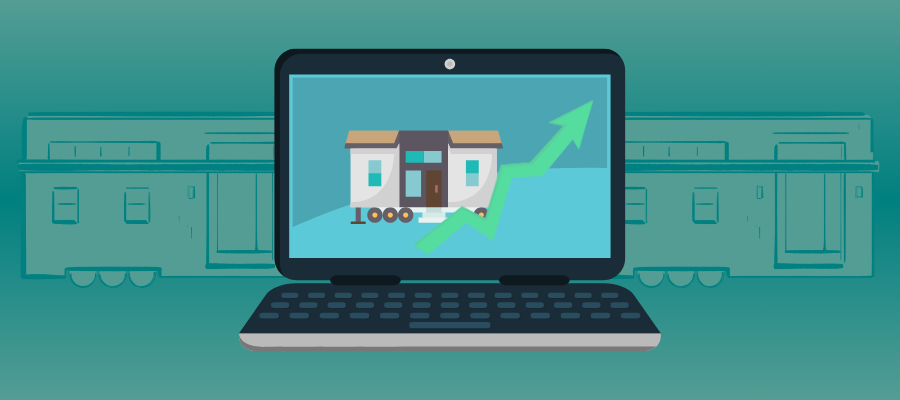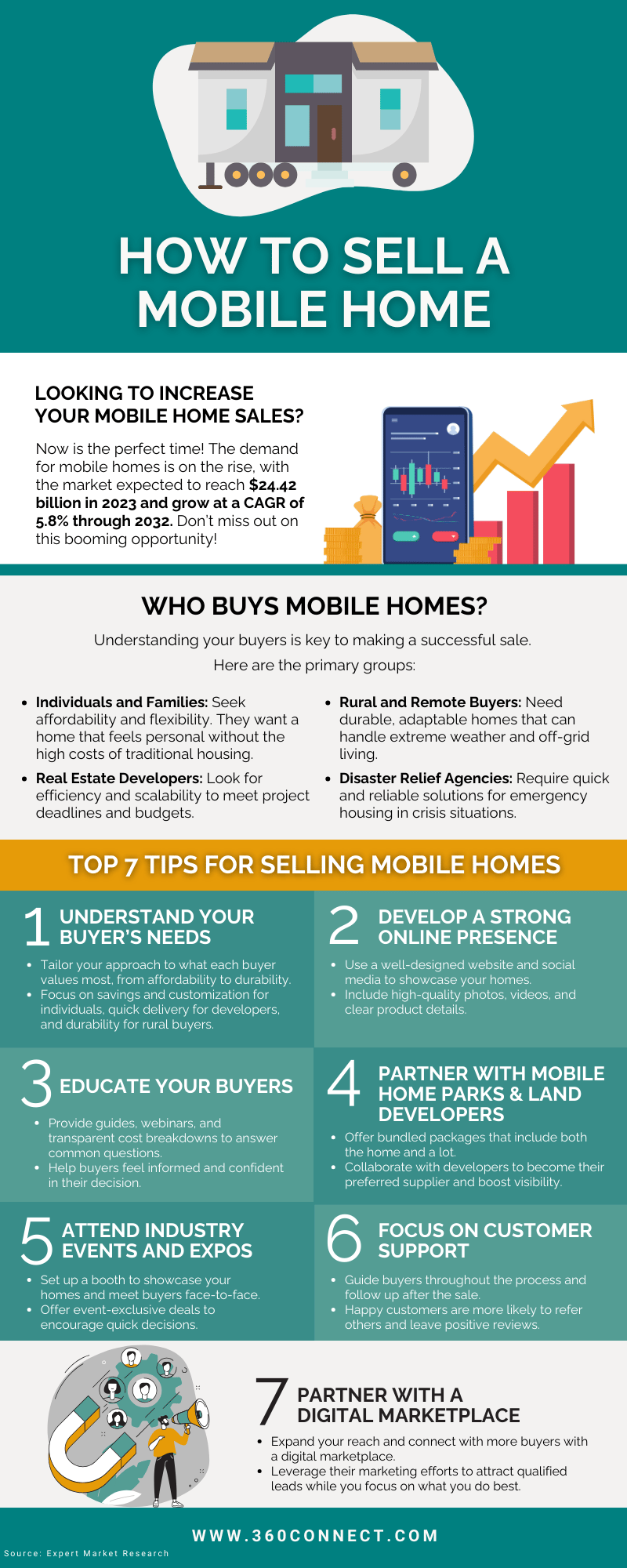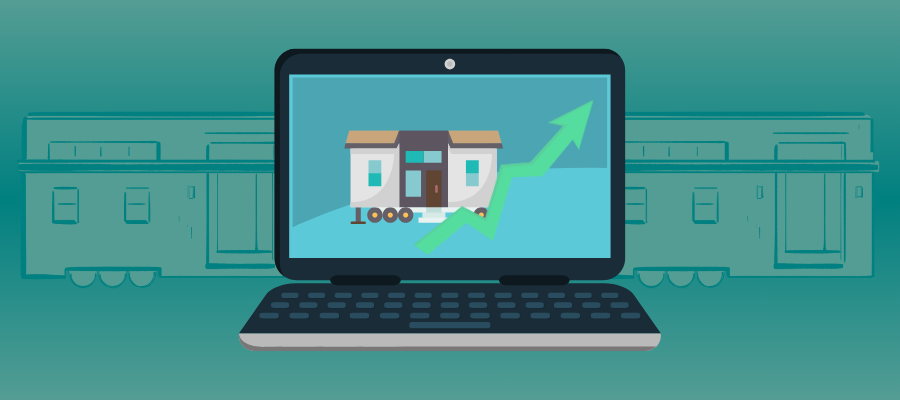
How to Sell a Mobile Home
Table of Contents
Looking to sell or increase mobile home sales? Smart move, because the market is expected to grow significantly. The manufactured housing market is projected to reach $24.42 billion in 2023 and grow at a CAGR of 5.8% through 2032.— Simply put, now is a great time to determine how to sell a mobile home!
As a modular or manufactured home supplier, you understand mobile homes present unique solutions for various buyers, from real estate developers seeking quick, affordable housing to rural communities needing sustainable, relocatable living options. Thus, understanding your buyer and refining your approach is crucial to success. This guide will walk you through the best practices for selling mobile homes. In addition, we’ll provide a basic overview of everything you need to know to determine how to sell a mobile home.
Who Buys Mobile Homes?
Before diving into the strategies on how to sell a mobile home, let’s look at the key buyers in the market:
- Individuals and Families: Many first-time homebuyers, retirees, or those seeking affordable housing turn to mobile homes. These buyers appreciate the cost savings, lower property taxes, and the flexibility to own a home without the expense of traditional real estate.
- Real Estate Developers: Developers look for efficiency, affordability, and scalability for projects like community developments or affordable housing. Mobile homes allow them to quickly build and expand communities while controlling costs.
- Rural and Remote Communities: Buyers in these areas need durable, easy-to-deliver homes that can handle varied climates and limited infrastructure. Mobile homes are often a practical choice due to their affordability and adaptability.
- Disaster Relief Agencies: Speed and reliability are crucial for these buyers. They need homes that can be quickly deployed to provide safe, temporary shelter for those in need after emergencies like hurricanes, wildfires, or other natural disasters.
7 Tips on How to Sell a Mobile Home
Now that you understand who your buyers are, let’s dive into strategies that can help you sell more mobile homes effectively.

1. Understand Your Buyer’s Needs
Each buyer is different. And while they may be looking for the same solution, their reasoning is different—and your marketing and sales approach should reflect that. To properly reach your target audience, you’ll need to understand their needs and what motivates them to buy. Here’s how to approach each one:
Individuals and Families
Prioritizes affordability and flexibility when determining how to sell a mobile home to individuals and families. They’re looking for a comfortable, cost-effective place to live without the hefty price tag of a traditional home. Focus on highlighting the savings they’ll enjoy, not only on the initial purchase but also on maintenance and utility costs. Talk about customization options that make the home feel personal, like choosing different floor plans or interior finishes. Make it clear that mobile homes can be as unique as they are.
Real Estate Developers
Wants efficiency, scalability, and the ability to bring projects to life quickly. They’re interested in how mobile homes can help them meet deadlines and budgets, especially when developing new communities. Highlight how mobile homes can be delivered quickly and installed with minimal hassle. If you have experience working with other developers, share that—it helps build trust and credibility.
Rural and Remote Buyers
Need durability and adaptability. They’re often in areas with extreme weather or limited infrastructure, so it’s important to emphasize features like robust insulation, energy-efficient designs, and the ability to function off-grid if needed. Focus on how your homes can withstand the elements while offering modern comforts, even in remote locations.
Disaster Relief Agencies
Need a partner they can rely on in emergencies. They’re looking for homes that can be deployed quickly and easily in crisis situations, providing safe shelter for those in need. When pitching to these agencies, emphasize your ability to deliver homes fast, your experience with large orders, and your commitment to providing quality products during times of need.
Understanding what matters most to each buyer type will help you tailor your messaging, making it more effective and impactful.
Related: Top 5 Tips to Reach B2B Decision Makers
2. Develop a Strong Online Presence
Your website is your digital storefront, and most buyers will start their search for mobile homes online. A well-designed, informative website can be a powerful sales tool. Here’s how to sell a mobile home via a strong online presence:
Showcase Your Homes Visually
High-quality images, videos, and virtual tours can make a big difference. Buyers want to see what they’re getting, so include plenty of photos that highlight different features and styles. Videos or 360-degree tours can be particularly effective for giving a comprehensive view of the space.
Provide Clear, Detailed Information
Buyers want all the facts upfront—pricing, dimensions, floor plans, and customization options. Make sure your website includes detailed product descriptions and answers to common questions.
Use SEO to Attract the Right Traffic
Optimizing your website with the right keywords can help you show up in search results when buyers are looking for mobile homes. Focus on terms like “affordable mobile homes,” “manufactured homes for sale,” or “customizable modular homes.” This can increase your visibility and bring in more qualified leads.
Social Media
The second place most buyers search for your business is social media. Ensure your platforms are up to date and provide beneficial information. In addition, run strong social media campaigns to help increase web traffic or generate leads directly. Overall, a strong social media presence can help you build brand loyalty, foster relationships, and sell more mobile homes.
- Facebook: Run targeted ads to reach people who might be looking for a new place
- Instagram: Post photos and share customer stories.
- LinkedIn: Share updates, join groups, and stay active in conversations related to housing and development. It’s a good way to get your name in front of serious buyers.
By investing in your online presence, you make it easier for buyers to find you and learn about what you have to offer.
3. Educate Your Buyers
If you’re looking to sell more mobile homes, you’ll want to be the one who lets buyers know they need one and the benefits they offer. Unfortunately, a lot of people may have misconceptions about mobile homes, or they simply don’t understand the buying process. But the good news is that’s where you come in! By providing helpful, educational resources, you can guide buyers through the process, build trust along the way, and establish how to sell a mobile home.
Create Guides and Resources
Offer downloadable guides or blog posts that explain the basics—like “What to Expect When Buying a Mobile Home” or “Top 5 Benefits of Modular Homes.” These resources can answer common questions and help buyers feel more informed. You can also use these resources in emails and other digital marketing campaigns.
- Related: How to Grow Your Business with Content Marketing
Host Webinars or Virtual Info Sessions
These can be a great way to connect with potential buyers and answer their questions in real-time. A 30-minute session covering topics like financing options or how to choose the right floor plan can go a long way in building the client’s trust.
Be Transparent About Costs
A big concern for many buyers is understanding the total cost, including delivery, setup, and any upgrades. Break down these expenses clearly so there are no surprises. For example, you can include a cost calculator on your website.
Educating your buyers helps them feel more comfortable with their decision, making them more likely to choose you as their supplier.
4. Partner with Mobile Home Parks and Land Developers
Teaming up with mobile home parks and land developers can make your homes even more attractive to buyers. It’s all about offering a complete package that makes things simple.
Offer Package Deals
Create bundled offers that include both the home and a lot in a preferred park. This can make it easier for individual buyers who might be unsure about where to place their new home. It simplifies their decision-making process and makes your offering more attractive.
Be a Preferred Supplier
Reach out to land developers and mobile home parks to become a preferred supplier. This can lead to consistent orders and establish long-term business relationships. It also makes your product the go-to option for their buyers.
Cross-Promote to Boost Visibility
Collaborate with your partners on marketing efforts. For example, you could co-host an open house event or feature each other’s listings on your websites. It’s a win-win that can bring more traffic and attention to your products.
Partnering with others makes it easier for buyers to see the full picture, making them more likely to choose you.
5. Attend Industry Events and Expos
Industry events, like trade shows, are a great way to meet potential buyers face-to-face and show them what you have to offer.
Set Up a Stand-Out Booth
When you attend trade shows, make sure your booth stands out with bright displays, brochures, etc. It’s all about making a strong first impression.
Offer Special Deals
Give people a reason to act quickly by offering event-only discounts or special financing options. This can create a sense of urgency and get buyers excited about making a decision on the spot.
Focus on Building Connections
Beyond selling, these events are a great place to meet other professionals who might need your homes or are looking for partnerships. Building relationships can lead to new opportunities down the road.
Attending events makes you more visible and helps you build trust with potential buyers.
6. Focus on Customer Support
Good customer service can make a huge difference in whether you make the sale or not. Here are some customer support tips to keep in mind when determining how to sell a mobile home.
Be There Every Step of the Way
Make sure buyers have someone to talk to throughout the process. Whether it’s answering questions, giving updates, or just checking in, this can make the experience a lot smoother for them.
Follow Up After the Sale
Don’t forget about your buyers once the sale is done. Follow up to see how they’re settling in and if they need any help with maintenance or warranty issues. It shows that you care about their experience.
- Related: How to Write a Follow-Up Sales Email that Closes the Deal
Ask for Reviews
Happy customers are your best advertisement. Encourage them to leave a review online or share their story. Positive feedback can make a big difference for other buyers who are still on the fence.
Great customer support doesn’t just help you close the deal—it can turn buyers into long-term advocates for your business.
7. Partner with a Digital Marketplace
If you want to reach more buyers and figure out how to sell a mobile home efficiently, partnering with a digital marketplace can be a game-changer. These platforms connect your mobile homes with potential buyers quickly and efficiently, acting as a bridge between you and people actively searching for housing solutions.
Expand Your Reach
Digital marketplaces allow you to reach a much larger audience than you could on your own. Think about it—buyers from all over the country can find your homes through these platforms, which means more leads coming your way without increasing your marketing spend.
Targeted Buyer Matching
Many digital marketplaces use smart algorithms to match buyers with the best suppliers for their needs. This means that when someone is looking for a mobile home that fits your offering, you’ll get connected automatically. It saves you time and ensures you’re reaching people who are more likely to be interested in what you have to offer.
Leverage Marketplace Marketing
These marketplaces often have their own marketing efforts, which means they’re actively promoting their listings to potential buyers. By listing your homes through them, you benefit from their outreach. This could include SEO, social media campaigns, and more—boosting visibility without you having to do all the legwork yourself.
Simplified Sales Process
Digital marketplaces often streamline the buying process, making it easy for buyers to compare options, ask questions, and even start the purchasing process directly through the platform. This makes the transaction smoother for both you and your customers, reducing the time it takes to finalize a sale.
Focus on What You Do Best
By letting the marketplace handle some of the tedious work, you can focus on what you do best—closing mobile home sales. It’s a way to expand your sales without stretching your team too thin.
Partnering with a digital marketplace helps you tap into new markets, find qualified buyers, and close sales faster. It’s a great strategy to grow your business without the need for a massive investment in your own digital marketing.
Related: What to Expect When You Become a New Lead Partner
Final Thoughts on How to Sell a Mobile Home
Selling mobile homes requires more than just having a quality product. It’s about understanding what makes each buyer tick, whether they’re families looking for affordable living, developers aiming for quick project turnaround, or agencies in need of emergency housing solutions. By focusing on building a strong online presence, educating your buyers, forming valuable partnerships, and leveraging digital marketplaces, you can position your business as a trusted and reliable supplier.
